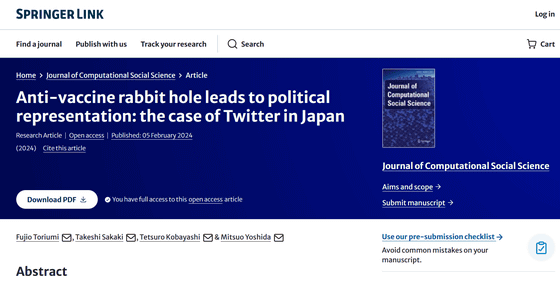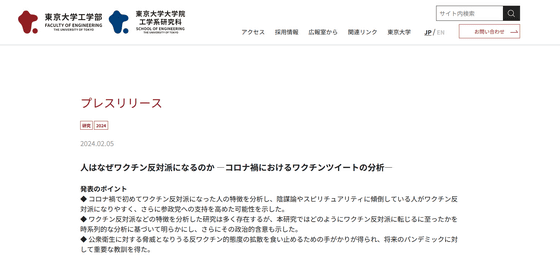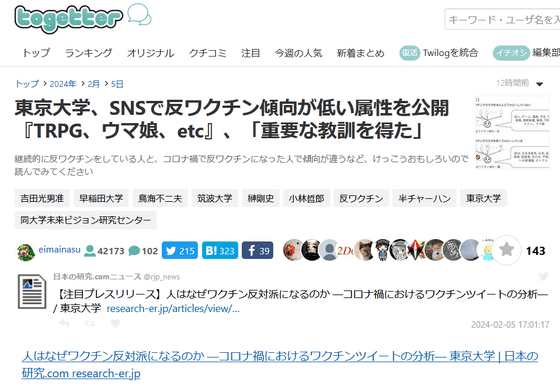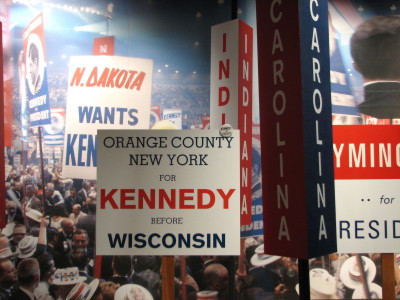``People who have become anti-vaccine since the coronavirus pandemic are more likely to be inclined to conspiracy theories and spirituality,'' researchers from the University of Tokyo, Waseda University, and University of Tsukuba announced.

In the wake of the novel coronavirus pandemic, research and development of mRNA vaccines has made rapid progress, and a vaccine compatible with the new coronavirus (SARS-CoV-2) has been released. Researchers from the University of Tokyo, Waseda University, and the University of Tsukuba have announced the results of analyzing posts posted on X (formerly Twitter) by people who oppose vaccination against the new coronavirus.
Anti-vaccine rabbit hole leads to political representation: the case of Twitter in Japan | Journal of Computational Social Science

Why are people anti-vaccine? - Analysis of vaccine tweets during the coronavirus pandemic - | Press Release | UTokyo-Eng
https://www.tu-tokyo.ac.jp/press/pr2024-02-05-001

A research group led by Professor Fujio Toriumi of the University of Tokyo's Graduate School of Engineering, Visiting Researcher Takeshi Sakaki of the University's Future Vision Research Center, Professor Tetsuro Kobayashi of Waseda University, and Associate Professor Mitsuo Yoshida of the University of Tsukuba is conducting research on anti-vaccine opponents during the coronavirus pandemic. Tweets were analyzed using machine learning.
The research group collected approximately 100 million tweets containing the word 'vaccine' collected from January to December 2021. Next, we used machine learning to extract and classify the collected tweets into three clusters: 'pro-vaccine tweets,' 'anti-vaccine tweets,' and 'tweets criticizing vaccine policy.' We then identified accounts that tweet or retweet many anti-vaccine tweets and defined them as ``accounts that spread anti-vaccine tweets.'' Furthermore, users who follow many accounts that spread anti-vaccine tweets were categorized as 'anti-vaccine' users.
As a result, ``people who were anti-vaccine before the coronavirus pandemic'' were ``highly interested in politics and have strong ties to liberal political parties,'' whereas ``people who became anti-vaccine for the first time during the coronavirus pandemic'' were. While they have little interest in politics, they have a strong interest in conspiracy theories, spirituality, natural foods, and alternative medicine.'' Topics such as conspiracy theories and spirituality have been shown to be triggers for vaccine opponents, the research group said.
There seems to be a difference in the keywords frequently written in the account profiles of people who hardly follow anti-vaccine clusters and people who follow anti-vaccine clusters a lot.

In addition, keywords such as 'Haruma Miura,' 'group stalking,' 'technological crime,' 'waves,' 'space,' 'spirituality,' and 'fabric softener' are frequently used in the profile texts of people who have become anti-vaccines since the coronavirus pandemic. It is said that it appeared on. Furthermore, the research group noted that while people who have become anti-vaccine since the coronavirus pandemic have weak ties with existing political parties, they are rapidly strengthening ties with political parties that advocate anti-vaccination. It is pointed out that this may have led to the participation of political parties winning seats in the 2018 House of Councilors election.

The research group said, ``Although conspiracy theories and spirituality themselves may not have direct political connotations, it has become clear that some people use these as a gateway to develop anti-vaccine attitudes. In order to maintain public health during future pandemics, methodologies that disassociate conspiracy theories and spirituality from spreading anti-vaccination attitudes will be required. This is an observational study, and it has not been possible to rigorously verify causal effects.In this regard, analysis that combines experiments and social surveys is needed.''
In addition, you can see the rebuttal posts from vaccine opponents against this study below.
The University of Tokyo releases attributes with low anti-vaccine tendencies on SNS 'TRPG, Uma Musume, etc.', 'I learned an important lesson' - Togetter
https://togetter.com/li/2308960

Related Posts:
in Web Service, Science, Posted by log1i_yk







